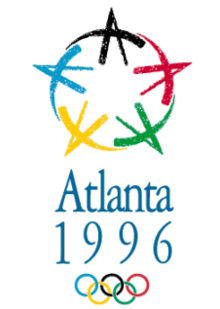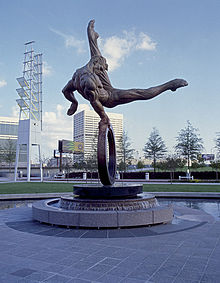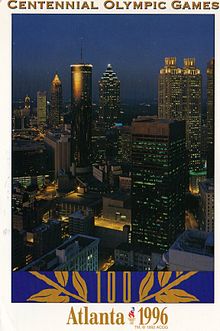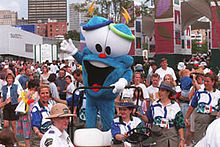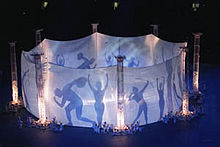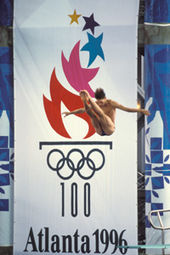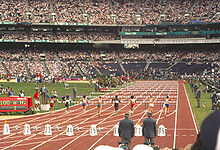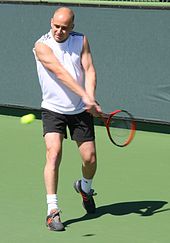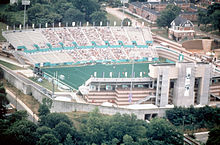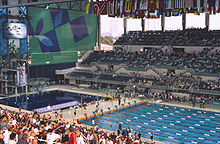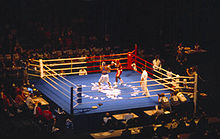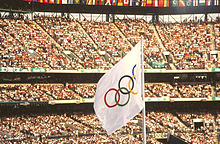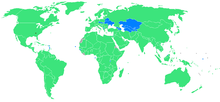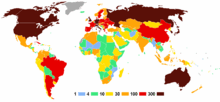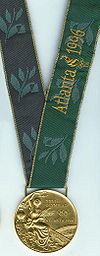- 1996 Summer Olympics
-
Games of the XXVI Olympiad 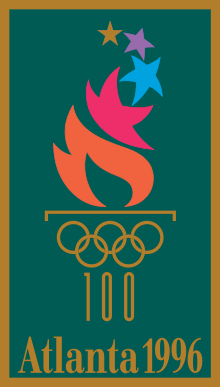
Host city Atlanta, Georgia, United States Motto The Celebration of the Century Nations participating 197 Athletes participating 10,320
(6,797 men, 3,523 women)Events 271 in 26 sports Opening ceremony July 19 Closing ceremony August 4 Officially opened by President Bill Clinton Athlete's Oath Teresa Edwards Judge's Oath Hobie Billingsley Olympic Torch Muhammad Ali Stadium Centennial Olympic Stadium The 1996 Summer Olympics of Atlanta, officially known as the Games of the XXVI Olympiad and unofficially known as the Centennial Olympics, was an international multi-sport event which was celebrated in 1996 in Atlanta, Georgia, United States.
Contents
Host city selection
Main article: Bids for the 1996 Summer OlympicsAtlanta was selected on September 18, 1990, in Tokyo, Japan, over Athens, Belgrade, Manchester, Melbourne, and Toronto at the 96th IOC Session. Atlanta's bid to host the Summer Games that began in 1987 was considered a long-shot, since the U.S. had hosted the Summer Olympics just 12 years earlier in Los Angeles. Atlanta's main rivals were Toronto, whose front running bid that began in 1986 seemed almost sure to succeed after Canada had held a successful 1988 Winter Olympics in Calgary and Melbourne, Australia, who hosted the 1956 Summer Olympics and felt that the Olympic Games should return to Australia. The Athens bid was based on sentiment, the fact that these Olympic Games would be the 100th Anniversary of the first Summer Games in Greece in 1896.
1996 Summer Olympics bidding results[1] City NOC Name Round 1 Round 2 Round 3 Round 4 Round 5 Atlanta  United States
United States19 20 26 34 51 Athens  Greece
Greece23 23 26 30 35 Toronto  Canada
Canada14 17 18 22 — Melbourne  Australia
Australia12 21 16 — — Manchester  Great Britain
Great Britain11 5 — — — Belgrade  Yugoslavia
Yugoslavia7 — — — — Effect on the city
Many consider the Games to be instrumental in transforming Atlanta into the cosmopolitan city it is today. The Games also resulted in many modern infrastructure improvements. One example is the mid-rise dormitories built for the Olympic Village, which became the first residential housing for Georgia State University, and is now used by the Georgia Institute of Technology. Another example is Centennial Olympic Stadium, which by design was later converted into the baseball-specific Turner Field for the Atlanta Braves after the Games concluded, as there was no long-term need for a track and field venue in the city. Centennial Olympic Park, which was built for the events, is the city's lasting memorial of the games. The park initiated a revitalization of the surrounding area, and now serves as the hub for Atlanta's newly-emerging tourist district.
Cost
The Atlanta Olympics followed the financial model established by the 1984 Olympic Games in Los Angeles. The cost to stage the Games was US$1.8 billion. Governmental[clarification needed] funds were used for security, and around $500 Million of taxpayer money was used on the physical infrastructure including streetscaping, road improvements, Centennial Olympic Park, expansion of airport, improvements in public transportation, and redevelopment of public housing projects[2] but neither paid for the actual Games and the new Venues themselves.[3] To pay for the games, Atlanta relied on commercial sponsorship and ticket sales, resulting in a profit of $10 million.[4]
Criticisms
Atlanta's heavy reliance on corporate sponsorship caused many to consider the Games to be overly commercialized. Coca-Cola, whose corporate headquarters is in Atlanta, received criticism for being the exclusive drink offered in Olympic venues.[citation needed] In addition, the city of Atlanta was found to have been competing with the IOC for advertising and sponsorship dollars. The city licensed street vendors who sold certain products over others, and therefore provided a presence for companies who were not official Olympic sponsors.[5][6] In defense, the organizing committee stated the heavy corporate sponsorship was part of America's culture of capitalism.[5]
A report prepared by European Olympic officials after the Games was critical of Atlanta's performance in several key issues, including the level of crowding in the Olympic Village, the quality of available food, the accessibility and convenience of transportation, and the Games' general atmosphere of commercialism.[7] The opening ceremony, featuring 500 cheerleaders and 30 pickup trucks, was also seen as "garish" by some observers and considered questionable in taste by many foreign visitors, and many American spectators claim it had nothing to do with American culture.[8]
The Atlanta Olympics were marred by the Centennial Olympic Park bombing on July 27. Security Guard Richard Jewell discovered the pipe bomb and immediately notified law enforcement and helped evacuate as many people as possible from the area before it exploded. Although Jewell's quick actions are credited for saving many lives, the bombing killed spectator Alice Hawthorne wounded 111 others, and caused the death of Melih Uzunyol by heart attack. Eric Robert Rudolph was charged with and confessed to this bombing and several others. He is now in a federal prison in Colorado serving a sentence of life imprisonment.
At the closing ceremony, IOC President Juan Antonio Samaranch said in his closing speech, "Well done, Atlanta" and simply called the Games "most exceptional." This broke precedent for Samaranch, who had traditionally labeled each Games "the best Olympics ever" at each closing ceremony, a practice he resumed at the subsequent Games in Sydney in 2000.[9]
Songs and themes
The Olympiad's official theme, "Summon the Heroes," was written by John Williams, making it the third Olympiad for which he has composed. The song "The Power of the Dream", composed by Kenneth "Babyface" Edmonds and David Foster, with words by Linda Thompson was performed in the opening ceremony by Céline Dion accompanied by Foster and the Atlanta Symphony Orchestra and Centennial Choir. Gladys Knight sang "Georgia on My Mind", Georgia's official state song, at the opening ceremony. The closing ceremony featured Gloria Estefan singing "Reach", the official theme song of the 1996 Olympics. At the closing of the ceremony Trisha Yearwood performed the Olympics song "The Flame" just before the torch was extinguished.
Mascot
Main article: Izzy (Mascot)The mascot for the Olympiad was an abstract, animated character named Izzy. In contrast to the standing tradition of mascots of national or regional significance in the city hosting the Olympiad, Izzy was an amorphous, fantasy figure.
Highlights
A record 197 nations, all current IOC member nations, took part, with a record 79 of them winning at least one medal. Palestine was allowed to compete in the Olympics for the first time. Also for the first time, Olympic medals were won by the athletes from Armenia, Azerbaijan, Belarus, Burundi, Ecuador, Georgia, Hong Kong, Kazakhstan, Moldova, Mozambique, Slovakia, Tonga, Ukraine, and Uzbekistan. Softball, beach volleyball and mountain biking debuted on the Olympic program, together with women's soccer/football and lightweight rowing.
Opening ceremony
Muhammad Ali lit the Olympic torch during the opening ceremonies of the games and received a replacement gold medal for his boxing victory in the 1960 Summer Olympics. Slovene gymnast Leon Štukelj arose at the opening ceremony as one of the oldest living sportsmen in the world (age 97)
Gymnastics
Kerri Strug of the United States women's gymnastics team vaulted with an injured ankle and landed on one foot. The US women's gymnastics team won its first gold medal. Shannon Miller of the United States won the gold medal on the balance beam event, the first time an American Gymnast had won an individual gold medal outside of a contested Olympic games.
The Spanish team won the first gold medal of the new competition by women's rhythmic group all-around. The team was formed by Estela Giménez, Marta Baldó, Nuria Cabanillas, Lorena Guréndez, Estíbaliz Martínez and Tania Lamarca.
Swimming
Amy Van Dyken won four gold medals in the Olympic swimming pool, the first American woman to win four titles in a single Olympiad. Penny Heyns,swimmer of South Africa, won the Gold Medals in both the 100 metres and 200 metres breaststroke events. Michelle Smith of Ireland won three gold medals and a bronze in swimming. She remains her nation's most decorated Olympian. However, her victories were overshadowed by doping allegations even though she did not test positive in 1996. She received a four-year suspension in 1998 for tampering with a urine sample, though her medals and records were allowed to stand.
Weightlifting
Naim Süleymanoğlu became the first weightlifter to win three gold medals.
Track and field
Donovan Bailey of Canada won the men's 100 m, setting a new world record of 9.84 seconds at that time. He also anchored his team's gold in the 4x100 m relay. Michael Johnson won gold in both the 200 m and 400 m, setting a new world record of 19.32 seconds in the 200 m. Johnson afterward began disputing Bailey's unofficial title as the "world's fastest man", which later culminated in a 150-metre race between the two to settle the issue. Marie-José Pérec equaled Johnson's performance, although without a world record, by winning the rare 200 m/400 m double.
Carl Lewis won his 4th long jump gold medal at the age of 35.
Cycling professionals were admitted to the Olympics, with five-time Tour de France winner Miguel Indurain winning the inaugural individual time trial event.
National firsts
Deon Hemmings became the first woman to win an Olympic gold medal for Jamaica and the English-speaking West Indies.
Lee Lai Shan won a gold medal in sailing, the only Olympic medal that Hong Kong ever won as a British colony (1952–1997). This meant that for the only time, the colonial flag of Hong Kong was raised to the accompaniment of the British national anthem God Save the Queen, as Hong Kong's sovereignty was later transferred to China in 1997.
The US women's soccer team won the gold medal in the first ever women's soccer event.
Spain won gold at the inaugural rhythmic gymnastics groups competition defeating the favorite and reigning world champion Bulgaria who had won the World Championship less than a month before.
Other
Kurt Angle of the United States won the gold medal in 100 kg (220 lb) freestyle wrestling. He competed with a broken neck. After the '96 Olympic Games he pursued a career in "Sports Entertainment" style wrestling competing for both World Wrestling Entertainment and Total Nonstop Action Wrestling. Alexander Karelin won his third Olympic gold medal as a Greco-Roman wrestler.
Andre Agassi won the gold medal in tennis. This helped him become the first male player to ever win the career Golden Slam. Deng Yaping of China won two gold medals in Women singles and doubles of table tennis. She also won these two titles in the 1992 Barcelona Olympics.
Xeno Müller won gold for the Men's single scull event (rowing) in his first Olympic appearance. His time of 6:44.85 is still the current Olympic record.
Venues
Main article: Venues of the 1996 Summer OlympicsEvents of the Atlanta Games were held in a variety of areas. A number were held within the Olympic Ring, a three-mile circle from the center of Atlanta. Others were held at Stone Mountain, about 20 miles outside of the city. To broaden ticket sales, other events, such as soccer, occurred in various cities in the southeast (see below).[10][11]
Inside the Olympic Ring
- Centennial Olympic Stadium (Now known as Turner Field) – Opening/Closing Ceremonies, Athletics
- Georgia Dome – Basketball (final), Gymnastics (artistic), Handball (men's final)
- Georgia Tech Aquatic Center – Diving, Modern pentathlon (swimming), Swimming, Synchronized Swimming, Water Polo
- Atlanta-Fulton County Stadium – Baseball
- Georgia World Congress Center – Fencing, Handball, Judo, Modern pentathlon (fencing, shooting), Table Tennis, Weightlifting, Wrestling
- Omni Coliseum – Volleyball (indoor final)
- Panther Stadium – Field hockey
- Herndon Stadium – Field hockey (final)
- Georgia State University Sports Arena – Badminton
- Forbes Arena (Morehouse College) – Basketball
- Alexander Memorial Coliseum – Boxing
- Cycling road course - hiking(road)
- Marathon course - cycling(marthon)
- Walking course - Athletics (walks)
Elsewhere in metropolitan Atlanta
- Stone Mountain Tennis Center (at Stone Mountain, Georgia) – Tennis
- Stone Mountain Park Archery Center – Archery
- Stone Mountain Park Velodrome – Cycling (track)
- Atlanta Beach (Jonesboro, Georgia) – Volleyball (beach)
- Wolf Creek Shooting Complex – Shooting
- Georgia International Horse Park (Conyers, Georgia) – Cycling (mountain), Equestrian, Modern pentathlon (riding, running)
- Lake Lanier (Near Gainesville, Georgia) – Canoeing (sprint), Rowing
Other venues
- Sanford Stadium (Athens, Georgia) – Football (final)
- Stegeman Coliseum (Athens, Georgia) – Gymnastics (rhythmic), Volleyball (indoor)
- Wassaw Sound (at Savannah, Georgia) – Sailing
- Ocoee Whitewater Center (Polk County, Tennessee) – Canoeing (slalom)
- Golden Park (Columbus, Georgia) – Softball
- Legion Field (Birmingham, Alabama) – Football
- RFK Stadium (Washington, D.C.) – Football
- Citrus Bowl (Orlando, Florida) – Football
- Miami Orange Bowl (Miami, Florida) – Football
After the Olympics, Centennial Olympic Stadium was converted into Turner Field, which became home of the Atlanta Braves baseball team for the 1997 season. Once the Braves moved, Atlanta-Fulton County Stadium was demolished, and the site became a parking lot for Turner Field; the Omni was demolished that same year to make way for Philips Arena on its site. The only other Olympic venue to be closed since has been the Miami Orange Bowl, demolished in 2008 for the Florida Marlins' new baseball stadium to be built on its site.
Sports
 Archery ()
Archery () Athletics ()
Athletics () Baseball ()
Baseball () Basketball ()
Basketball () Badminton ()
Badminton () Boxing ()
Boxing () Canoeing ()
Canoeing () Cycling ()
Cycling () Diving ()
Diving () Equestrian ()
Equestrian ()
 Fencing ()
Fencing () Field hockey ()
Field hockey () Football ()
Football () Gymnastics ()
Gymnastics () Handball ()
Handball () Judo ()
Judo () Modern pentathlon ()
Modern pentathlon () Rowing ()
Rowing () Sailing ()
Sailing () Shooting ()
Shooting ()
 Softball ()
Softball () Synchronized swimming ()
Synchronized swimming () Swimming ()
Swimming () Table tennis ()
Table tennis () Tennis ()
Tennis () Volleyball ()
Volleyball () Water polo ()
Water polo () Weightlifting ()
Weightlifting () Wrestling ()
Wrestling ()
Participating nations
Participants at Summer olympics 1996
Blue = Participating for the first time. Green = Have previously participated. Yellow square is host city (Atlanta)A total of 197 nations were represented at the 1996 Games, and the combined total of athletes was about 10,318.[12] Twenty-four countries made their Olympic debut this year, including eleven of the ex-Soviet countries that competed as part of the Unified Team in 1992. Russia competed independently for the first time since 1912, when it was the Russian Empire. The Federal Republic of Yugoslavia competed as Yugoslavia.
The 14 countries making their Olympic debut were: Azerbaijan, Burundi, Cape Verde, Comoros, Dominica, Guinea-Bissau, Macedonia, Nauru, Palestine, Saint Kitts and Nevis, Saint Lucia, São Tomé and Príncipe, Tajikistan and Turkmenistan.
The 10 countries making their Summer Olympic debut (after competing at the 1994 Winter Olympics in Lillehammer) were: Armenia, Belarus, Czech Republic, Georgia, Kazakhstan, Kyrgyzstan, Moldova, Slovakia, Ukraine and Uzbekistan. The Czech Republic and Slovakia attended the games as independent nations for the first time since the breakup of Czechoslovakia, while the rest of the nations that made their Summer Olympic debut were formerly part of the Soviet Union.
Broadcast rights
 Australia: Seven Network
Australia: Seven Network Belgium: BRTN
Belgium: BRTN Brazil: Rede Globo, Rede Bandeirantes, Rede Record and Rede Manchete
Brazil: Rede Globo, Rede Bandeirantes, Rede Record and Rede Manchete Brunei: RTB and Astro Olympics
Brunei: RTB and Astro Olympics Canada: CBC
Canada: CBC Chile: TVN
Chile: TVN China: CCTV
China: CCTV France: TF1
France: TF1 Germany: ARD and ZDF
Germany: ARD and ZDF Hong Kong: ATV and TVB
Hong Kong: ATV and TVB India: Doordarshan
India: Doordarshan Indonesia: TVRI
Indonesia: TVRI Ireland: RTÉ
Ireland: RTÉ Italy: Rai
Italy: Rai Japan: NHK
Japan: NHK Macau: TDM Olympics
Macau: TDM Olympics Malaysia: RTM TV1 and Astro Olympics
Malaysia: RTM TV1 and Astro Olympics Netherlands: NPO
Netherlands: NPO Philippines: PTV 4
Philippines: PTV 4 Poland: TVP
Poland: TVP Russia: VGTRK Olympiade
Russia: VGTRK Olympiade Singapore: Premiere 12
Singapore: Premiere 12 South Korea: KBS, MBC and SBS
South Korea: KBS, MBC and SBS Spain: TVE
Spain: TVE Switzerland: SRG SSR idee suisse
Switzerland: SRG SSR idee suisse Taiwan: TTV, CTV and CTS
Taiwan: TTV, CTV and CTS Thailand: National Sports
Thailand: National Sports United Kingdom: BBC
United Kingdom: BBC United States: 1000 NBC
United States: 1000 NBC
Medal table
Main article: 1996 Summer Olympics medal tableThese are the top ten nations that won medals at these Games. The host nation, United States, is highlighted.
Rank Nation Gold Silver Bronze Total 1  United States
United States44 32 25 101 2  Russia
Russia26 21 16 63 3  Germany
Germany20 18 27 65 4  China
China16 22 12 50 5  France
France15 7 15 37 6  Italy
Italy13 10 12 35 7  Australia
Australia9 9 23 41 8  Cuba
Cuba9 8 8 25 9  Ukraine
Ukraine9 2 12 23 10  South Korea
South Korea7 15 5 27 Disqualifications
Five athletes were disqualified for using banned drugs. A few of these athletes were reinstated since the drug they took had been declared illegal only a week before the Olympics.
See also
- 1996 Summer Paralympics
- Olympic games celebrated in the United States
- 1904 Summer Olympics – St. Louis
- 1932 Summer Olympics – Los Angeles
- 1932 Winter Olympics – Lake Placid
- 1960 Winter Olympics – Squaw Valley
- 1980 Winter Olympics – Lake Placid
- 1984 Summer Olympics – Los Angeles
- 1996 Summer Olympics – Atlanta
- 2002 Winter Olympics – Salt Lake City
Notes
- ^ IOC Vote History
- ^ "The Olympic Legacy in Atlanta - [1999] UNSWLJ 38; (1999) 22(3) University of New South Wales Law Journal 902". Archived from the original on 2009-06-19. http://www.austlii.edu.au/au/journals/UNSWLJ/1999/38.html#Heading21. Retrieved 2009-06-16.
- ^ Applebome, Peter (1996-08-04). "So, You Want to Hold an Olympics". The New York Times. http://www.nytimes.com/1996/08/04/weekinreview/so-you-want-to-hold-an-olympics.html?pagewanted=print. Retrieved 2008-08-17.
- ^ "Beijing Olympiad: Profit or Loss?". China Internet Information Center. http://www.china.org.cn/english/sports/111340.htm. Retrieved 2008-08-17.
- ^ a b McGill's master of the rings
- ^ Olympic bid smacks into $10M hurdle – fact mentioned in the 5th paragraph
- ^ "Olympic Games: Maligned Atlanta meets targets". The Independent (United Kingdom). 1996-11-15. Archived from the original on 2010-10-25. http://www.webcitation.org/5q0EnQ16f. Retrieved 2010-10-25.
- ^ "From Garish to Grand on Opening Night Day". CNN. http://sportsillustrated.cnn.com/events/1996/olympics/commemorative/day1.html. Retrieved 2010-04-03.
- ^ ESPN.com (2000-10-01). "Samaranch calls these Olympics 'best ever'". http://static.espn.go.com/oly/summer00/news/2000/1001/794339.html. Retrieved 2009-03-13.
- ^ Burbank, Matthew; et. al. (2001). Olympic Dreams: The Impact of Mega Events on Local Politics. Lynne Rienner Publishers. p. 97.
- ^ "Centennial Olympic Games". la84foundation.org. http://www.la84foundation.org/6oic/OfficialReports/1996/1996v2.pdf.
- ^ Olympics OFFICIAL Recap
References
- "Atlanta 1996". Olympic.org. International Olympic Committee. http://www.olympic.org/en/content/Olympic-Games/All-Past-Olympic-Games/Summer/Atlanta-1996.
- "All the Medallists since 1896". Olympic.org. International Olympic Committee. http://www.olympic.org/en/content/All-Olympic-results-since-1896/?AthleteName=&Games=1333922&Country=&Sport=&TargetResults=true&resultsPageIPP=30.
- [1] Digital Archive from the LA84 Foundation of Los Angeles
- [2] Digital Archive from the LA84 Foundation of Los Angeles
- [3] Digital Archive from the LA84 Foundation of Los Angeles
External links
- "Atlanta 1996". Olympic.org. International Olympic Committee. http://www.olympic.org/en/content/Olympic-Games/All-Past-Olympic-Games/Summer/Atlanta-1996.
- Time article
- New York Times article
- S Zebulon Baker, "Whatwuzit?: The 1996 Atlanta Summer Olympics Reconsidered", Southern Spaces, 21 March 2006. http://southernspaces.org/2006/whatwuzit-1996-atlanta-summer-olympics-reconsidered
Preceded by
BarcelonaSummer Olympic Games
Atlanta
XXVI Olympiad (1996)Succeeded by
SydneyOlympic Games Sports · Venues · Ceremonies · Medals · Medal tables · Medalists · IOC · NOCs · Symbols Summer Games Winter Games 1 Discounted ex post facto by the IOC. 2 Cancelled due to World War I. 3 Cancelled due to World War II. Events at the 1996 Summer Olympics (Atlanta) Archery • Athletics • Badminton • Baseball • Basketball • Boxing • Canoeing • Cycling • Diving • Equestrian • Fencing • Football • Gymnastics • Handball • Hockey • Judo • Modern pentathlon • Rowing • Sailing • Shooting • Softball • Swimming • Synchronized swimming • Table tennis • Tennis • Volleyball • Water polo • Weightlifting • WrestlingVenues of the 1996 Summer Olympics Olympic Ring Alexander Memorial Coliseum · Atlanta-Fulton County Stadium · Clark Atlanta University Stadium · Cycling road course · Georgia Dome · Georgia State University Gymnasium · Georgia Tech Aquatic Center · Georgia World Congress Center · Marathon course · Morehouse College Gymnasium · Morris Brown College Stadium · Olympic Stadium · Omni Coliseum · Walking courseMetro Atlanta Other venues Florida Citrus Bowl (Orlando, Florida) · Golden Park (Columbus, Georgia) · Legion Field (Birmingham, Alabama) · Ocoee Whitewater Center (Polk County, Tennessee) · Orange Bowl (Miami, Florida) · RFK Memorial Stadium (Washington, D.C.) · Sanford Stadium (Athens, Georgia) · University of Georgia Coliseum (Athens, Georgia) · Wassaw Sound (Savannah, Georgia)History of Atlanta Origins Standing Peachtree - Western and Atlantic Railroad (1836)Buildings Historic districts - Buildings listed on National Register: (Atlanta in Fulton Co.) - (Atlanta in DeKalb Co.) - Demolished buildings - Demolished public housing projectsCivil War Crime Atlanta Race Riot (1906) - Leo Frank lynching (1915) - Child murders (1979-1981) - Prison riots (1987) - Centennial Olympic Park bombing (1996)Culture Disasters Great Atlanta Fire (1917) - Tornado strikes downtown (2008)Events International Cotton Exposition (1881) - Piedmont Exposition (1887) - Cotton States and International Exposition (1895) - Gone with the Wind premiere (1939) - Democratic National Convention (1988) - Centennial Olympics (1996)People Mayors - Pioneers - History of Hispanics in Atlanta - History of African Americans in AtlantaPlaces History by neighborhood - Former neighborhoods and settlements - Ward system and expansion of city limits - Street names - History of Georgia Tech - Historic millsTransportation Atlanta Street Railway (1871) - Metropolitan Street Railroad (1882) - Atlanta Consolidated Street Railway (1891) - Transit strike (1950) - Atlanta Transit Company (1950) - Historic bridges - Historic ferries - Freeway revolts - Streetcars - Trolleybuses - ViaductsCategories:- 1996 Summer Olympics
- 1996 in multi-sport events
- History of Atlanta, Georgia
- Multi-sport events in the United States
- Olympic Games in the United States
- 1996 in Georgia (U.S. state)
Wikimedia Foundation. 2010.

